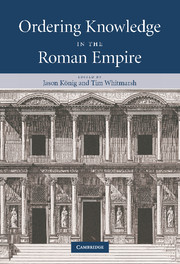1 - Ordering knowledge
Published online by Cambridge University Press: 28 August 2009
Summary
IMPERIAL KNOWLEDGE
This volume seeks to explore the ways in which particular conceptions of knowledge and particular ways of textualising knowledge were entwined with social and political practices and ideals within the Roman Imperial period. In the process, we explore the possibility that the Roman Empire brought with it distinctive forms of knowledge, and, in particular, distinctive ways of ordering knowledge in textual form.
The chapters following this one contain a series of case studies, examining the politics and poetics of knowledge-ordering within a wide range of texts, testing out each of them carefully for signs of their engagement with other works of similar type, and with the world around them. Our principal interest is in texts that follow a broadly ‘compilatory’ aesthetic, accumulating information in often enormous bulk, in ways that may look unwieldy or purely functional to modern eyes, but which in the ancient world clearly had a much higher prestige than modern criticism has allowed them. The prevalence of this mode of composition in the Roman world is astonishing, as will become clear in the course of this discussion. It is sometimes hard to avoid the impression that accumulation of knowledge is the driving force for all of Imperial prose literature. That obsession also makes its mark on verse, for example within the scrolls of didactic epic or in the anthologisation of epigrams.
- Type
- Chapter
- Information
- Ordering Knowledge in the Roman Empire , pp. 3 - 40Publisher: Cambridge University PressPrint publication year: 2007
- 5
- Cited by

